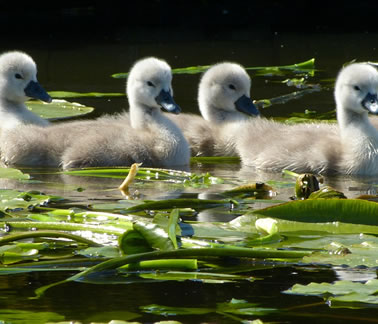The story so far: a freelance writer and editor for 20+ years, I jumped ship in April 2015 from bricks and mortar to live on a historic narrowboat – currently permanently moored in a busy marina in greenest Staffordshire.
This morning, I didn’t pay much heed when my chap shouted, ‘The carp’s dead!’ I thought ‘goldfish’ and carried on walking until he grabbed my hand and pulled me to the pontoon. There floating towards the algae and weeds on the shore was a golden beast of a fish, at least a foot long, about 25 pounds, its scales sparkling even under cloud cover. It didn’t look very well. The fish, which had been at the marina at least as long as my chap, was in fact dead.
I ran to get my iPhone to take a picture while it was still in its habitat but the marina constabulary (two maintenance and landscaping guys) had already been alerted. By the time I’d scurried back one of them was fishing the fish out with with two really big nets. I asked why.
‘It’ll just drift under the trees and decompose,’ he said, lying the fish on the grass, where it looked odd. ‘Nothing will take it.’ He snapped a photo too.
That must be one of the things we pay for to moor here: no nasty decomposition smells.
I went on my way to the shower block thinking about the fact that last week my chap suggested we have a go at fishing off the end of the boat to see if we can catch any of the two-foot pike in the marina – the biggest is rumoured to be three- to four-foot long. Imagine those swimming beneath you while you sleep? It’s like the National Marine Aquarium in Plymouth (I’m fond of that place).
On the way back, a friendly boater with a black labrador hailed me and, keeping her voice low, pointed to my right. ‘Three cygnets. They’ve only just hatched,’ she said.
Mum, dad and three fluffy grey things were just a skip away on the grass verge by the boats. I’d been so in my head, I might have missed them. For someone who writes poetry, I can be a tad unobservant.
The dog bounded towards the swans which hissed. Having lived here their whole lives, the two marina swans are tamer than normal swans, but they’re still swans.
‘They always hatch later than I think,’ I said, meaning the marina’s fluffy duckish, goosey, swanish life in general, and in mid-May rather than April. ‘The other day I saw six ducklings swimming by the end of our boat. It was lovely.’
‘Six?’ the woman asked, shocked. ‘There were eight.’
Ah. ‘It’s a shame there are so few ducklings in general’, I observed quickly, wondering if it was a fox whodunnit, or something else.
‘There are only two females in the marina.’
‘Why’s that?’
And then – as any questioner who asks ‘Why, why, why?’ probably deserves, I got a nature lesson that I’d rather not know. For several weeks, I’d noticed this paucity of female mallards both here and along the canal. I’d also noticed four or five drakes stalking each one, usually with a couple of additional characters hanging nearby. I’d not known whether to rejoice for the females or weep. Knowing a about nature thanks to David Attenborough (has he changed his name to Boaty McBoatface yet?) I suspected cry.
‘The drakes all jump on their backs and drown them, that’s why. They’re too randy … Thank God women don’t get that.’
The conversation went downhill from there but it revved up again when we circled back to the swans. ‘The cygnets should be okay – they’re very diligent parents,’ the woman said. ‘Still, a pike can always get one.’
Those dastardly, jagged-toothed pike. Maybe I’ll have to learn how to fish them after all.
‘I wouldn’t worry about the carp though. It probably died of old age.’
We also have mink here, which could take them. The other day I heard someone say, ‘The mink man’s just been’. Ever an urbanite, I thought they said ‘milkman’.
Enjoyed this post? Please sign up to my newsletter:

